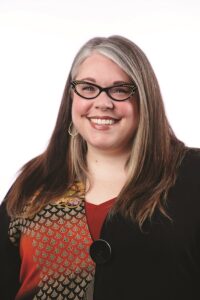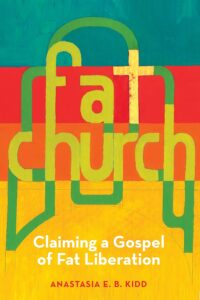Anastasia Kidd’s new book, Fat Church: Claiming a Gospel of Fat Liberation, fearlessly tackles the American industrial diet complex and unravels the threads of structural fatphobia. With persuasive data and unapologetic honesty, Kidd reframes the definition of “health” and invites readers on a journey of cognitive dissonance.

Kidd is director of contextual education at the Boston University School of Theology, she brings a unique Christian perspective to her exploration of fatness in her book. On weekdays, she works in Boston; on weekends, she serves as a summer pastor at the First Parish Church of Truro.
The prologue of Fat Church, which was published in April 2023, begins with a candid confession: she’s needed to write this book for more than 20 years.
After her mother fell ill with cancer, grief finally pushed Kidd to research American fatphobia. The ingrained diet culture prevented her mother from consuming nourishing foods, such as whole milk and peanut butter, even when she was in a frail state; the ideal of thinness was too firmly rooted.
The deeper Kidd delved into her research, the more her anger grew. “I had so much inside of me, I was almost ready to burst,” she said. In 2021, she transformed her research into a winning pitch for a Pilgrim Press competition and secured a book deal.
In the opening chapter, “A Big Fat Child of God,” Kidd writes: “I am an ordained United Church of Christ minister weighing around 350 pounds. [I reside] in a fat body within the social context of white American Christianity.”
Kidd grew up in the conservative Christian landscape of Jackson, Tenn., which largely shaped her negative perception of her body’s size. Her chapters begin with anecdotes and personal experiences of growing up and living as a fat person in America.

“Activism has always been rooted in storytelling,” said Kidd. She grounds her book in her own story as a white, upper-middle-class, progressive Christian woman and now fat activist.
The book serves as a “primer” for those who may be unfamiliar with fat activism and entrenched in diet culture. “I wrote it to be a very first stop for those who have never even opened their eyes or noticed anti-fatness in the country,” she said. “While my research focused on the U.S., this work holds global relevance.”
The U.S.’s diet culture and misleading health ideals have been propagated internationally through social media, advertising, and globalization, according to Kidd.
Her second chapter, titled “The ‘F’ Word,” begins succinctly: “I am fat.” Throughout the book, Kidd reclaims the term “fat” as a neutral identifier, shedding its characteristically negative emotional weight.
The term “obesity,” denoted as “ob*sity” in the book, she considers profoundly offensive because it is rooted in anti-fat prejudice. It stems from the Latin word obedere, meaning “to overeat” or “to eat oneself to the point of fatness.”
Kidd hopes her book will guide readers toward the concept of fat liberation, which she defines as “the liberation of all bodies — fat, thin, and everything in between — from rampant diet culture and the not-good-enough-ness it forces onto perfectly good people, as well as the ‘fat panic’ it breeds in society.”
The book’s final section is focused on Christianity’s fatphobic roots. “The church has historically tried to control bodies philosophically and structurally; it has been a part of creating this anti-fatness idea in the world,” said Kidd.
But Kidd’s thought-provoking book has meaning well beyond a Christian readership. “I would say if you can get through the God stuff, and it doesn’t make you ill, it’s also a pretty good secular primer,” Kidd remarked.
Kidd will be giving a talk about her book on the morning of Sunday, Aug. 20 at the First Parish Church in Truro. For readers picking up her book for the first time, Kidd advised, “Just be gentle with yourself and suspend disbelief, because when we open our eyes to new systems of oppression, it can seem so wild that we’ve been functioning in a world without seeing it.”



